Why Do Tech Bros Have the Worst Ideas?
Apollonian Intelligence, Transhumanism, Techno-Christianity, and the Dark Enlightenment: OH MY!
As I like to say on this channel, technology reflects the consciousness of the people creating it. And I am deeply concerned about the people creating our technologies, especially artificial intelligence.
For a few years now, transhumanists like Sam Altman, Elon Musk, and Ray Kurzweil have been promising the imminent arrival of artificial superintelligence. But OpenAI's GPT-5 arrived a few weeks ago and doesn't seem any closer to superintelligence than GPT-4. It still can't count the number of b's in the word 'blueberry' and industry experts called GPT-5 "overhyped and underwhelming." Sam Altman's breathless promises seem increasingly unfounded. As I've explained before, intelligence is mysterious and hard.
Meanwhile, everywhere you look in Silicon Valley today, people seem to be losing their minds, grasping desperately for some kind of meaning in the most unexpected of places. Rightwing tech billionaire Peter Thiel, who has been a Trump supporter and J.D. Vance mentor, recently talked to Christian New York Times columnist Ross Douthat about how the antichrist has arrived in the form of Greta Thunberg, the FDA, and the Nuclear Regulatory Commission (for Thiel the antichrist is a force promising peace and safety while creating a stagnant global state). This month, Thiel is hosting a four-part lecture series in San Francisco, all about the antichrist. Speaking of demonic, this week, Nicole Shanahan, ex-wife of Google co-founder Sergey Brin and former vice-presidential running mate of Robert F. Kennedy Jr., called the annual Burning Man festival "demonic" (of course she has attended seven out of the last ten burns).
This is the emergence of the Christian accelerationist movement, the inevitable convergence of techno-libertarianism and Christian nationalism. This techno-Christian movement is, in turn, a reaction to the rise of transhumanism and the cult of technological salvation. For those unfamiliar, transhumanism is the belief that we can merge with, or become, machines through technoscience—nanotechnology, AGI, and genetic engineering. But techno-Christianity and transhumanism are two sides of the same coin. They both seek transcendence through technology, and see any slowing of technological progress as a sort of evil or moral wrong.
For Thiel, his creepy data analytics company Palantir is part of the solution to the prevalence of "Satan's lies" because Palantir will pinpoint the "truth" within the massive troves of data collected by business and government and thereby prevent societal decay and the arrival of the antichrist. Palantir, guided by Thiel (and its CEO and co-founder Alex Karp), will allow us to see the world "as it truly is" through data analysis. For Thiel, technology is a weapon in a grand, cosmic battle between good and evil.
Alongside all of this there is the "Dark Enlightenment" or "Neoreaction (NRx)," a radically anti-democratic and anti-egalitarian political philosophy from Nick Land and Curtis Yarvin (who also goes by Mencius Moldbug). The Dark Enlightenment rejects democracy, lauds authoritarianism and even monarchy, leans into a genetic justification for social hierarchy, and is overall as hyperrational as it is retrograde.
We live in the strangest times, shaped by powerful people with the worst ideas. Where are the wise elders?
AI, Metaphysics, and Philosophical Questions of Consciousness
Maybe all of this ideological hysteria is bubbling up now because the arrival of large language models (LLMs) and the overhyped claims that Sam Altman and Elon Musk keep making about superintelligence have cast our long-standing meaning crisis in sharp relief. Suddenly questions of consciousness, metaphysics, and philosophy are urgently relevant. But most people are not steeped in philosophy or spirituality. Instead, they grasp for what is familiar. In addition, despite its long-standing secular rhetoric, the United States is still, in large part, a Christian country.
I think all of this ideological derangement in Silicon Valley (and increasingly the United States government) is the result of what philosopher Friedrich Nietzsche identified as an imbalance in Western culture: an overemphasis and overreliance on the Apollonian in us—reason, abstraction, a tendency to see parts rather than wholes, favoring utility over value and meaning, and black-and-white thinking. What we have lost is the Dionysian—an embodied, intuitive, holistic, and contextual orientation toward nature and the world.
When we lose a facility with the Dionysian in us, we flail about, reaching for frameworks that served us in the past, like Christianity. Or we double down on the denial of the existence of the Dionysian and become "New Atheists."
Furthermore, none of these radical ideologues, whether accelerationist, transhumanist, or neoreactionary are embodied or have any deep connection with the non-human, natural world. I will come back to that in a later post.
So today, I want to talk about the roots of what I (and others) see as a global pandemic of Apollonian thinking. Then, in subsequent posts, I will explore the ways that this Apollonian pandemic has led to the techno-capital machine of progress, commoditized spirituality, and how all of that makes this Intelligence Age a metaphysical crossroads requiring a radical, liberating, spiritual intervention in order to usher in a Wisdom Age instead.
The Aromancers, Sensitives, and Archivists of Lost Sensation
To illustrate our predicament I'd like to offer an embodied parable.
Imagine if, three centuries ago, Enlightenment Europeans decided that the senses of smell and taste weren't real. Instead, loudly confident European men declared that the sense of smell and taste were superstitious remnants of an irrational religious worldview, overly subjective and prone to emotional manipulation; primitive, unreliable; a useless vestige of our antiquated, animalistic past. From a scientific standpoint, they would say, food is merely fuel and any enjoyment of flavor is an indulgent illusion of primitive peoples. In this imagined world, public spaces are scrubbed by odorless purifiers and natural odors are considered a form of olfactory pollution.

Because this denial of smell and taste became accepted as fact it was taught in schools and parroted by governments and the media for centuries. Food has now become odorless, flavorless pastes and pills. Perfumes and incense are now passé, something encountered only in indigenous tribes or among the low and uneducated, or the spiritual "sensitives." Flowers are bred by industry only for visual enjoyment, thereby losing their natural fragrance. Smell and taste have began to atrophy, although some people refuse to succumb—there are now renegade epicureans, aromancers, fermenters, and perfumers still cooking with spice, aging cheeses, and burning incense. They are laughed at by the mainstream.
Archivists of lost sensation run scent libraries full of old books, essential oils, and cedar chests. The epicureans preach a gospel of pleasure and host lavish feasts in foodie speakeasies known as "burpies" where chefs smuggle real lemons, cardamom, and black pepper through underground networks. Rebellious aromancers cultivate sacred rituals full of burning incense and essential oils, operating hidden rooftop greenhouses full of aromatic jasmine, lavender, and rose. And fermenter anarchists smuggle sourdough starters, kombucha mothers, and various yeast cultures to create "stink bombs" for the sanitized public sphere, planting durian fruit and limburger cheese in government buildings and injecting spice into the nutrient paste factories.
In this odorless, flavorless world, those who want to be accepted by the mainstream and get good jobs ignore their sense of smell and taste, and pretend that they don’t exist. People who rant and rave about the smell of a rose or the life changing taste of a juicy peach are ridiculed as "woo woo" and superstitious. After all, everyone knows that sight, sound, and touch are the only real senses. Only ancient primitives believed all that smell and taste nonsense! Food is merely fuel, not a source of pleasure! Smells are odious and reminiscent of decaying flesh.
The Death of Dionysus and the Apollonian Mind
In some sense, this is what we have done by living entirely in the left hemisphere of the brain, starting with the European Renaissance (or perhaps even Socrates in ancient Greece) and accelerating with the Enlightenment and the Industrial Revolution. As Iain McGilchrist has explicated so well, the left hemisphere is logic, abstraction, control; it is literal, detached, machine-like.
We moderns have collectively denied the existence of right-hemisphere thinking—intuition, imagination, and holistic thinking. The right hemisphere of the brain sees nature and life in terms of process and flow rather than purposeless utility. We moderns have denied the existence of anything but meaningless, purposeless, material reality, not because transcendent reality was disproven scientifically (it wasn’t), but because those confident European men declared it so. This machinery of reason is an insatiable, formidable force that can justify colonizing half the world, treating nature like a mere resource to be pillaged, and reducing the sacred to a mere commodity.
In short, the reason we think that the cosmos is made only of purposeless and meaningless matter and energy (despite a failure to explain the emergence of life or consciousness) is because of our move into the left hemisphere.
For many people, this lopsided worldview is depressing and disenchanted, leaving them feeling isolated, irrelevant, fearful, and empty, yet overstimulated. People are so desperate for meaning, wisdom, and guidance that they turn to AI chatbots as counselors, friends, lovers, and even gods.
Because this left hemisphere thinking undergirds so much intellectual discourse and informs the ethos driving both technology innovation and politics today, I want to find a way to approach it that is simple and illuminating, without losing its multivalent properties. Inspired by the work of Iain McGilchrist and drawing from pre-Socratic Greece and the work of Friedrich Nietzsche, I am calling this left hemisphere tendency the "Apollonian Mind." Apollo was the Greek god of light, truth, reason, form, structure, law and order, and individuality. Granted, he was also associated with poetry and music so it's not a perfect metaphor. But it's good enough for our purposes.
I'm not saying that this kind of left-hemisphere, Apollonian orientation is a bad thing. Just that it's out of balance, that we have forgotten the Dionysian, and its wildness, instinct, emotion, and unity with nature. We obviously need reason or Apollonian Intelligence, just not at the exclusion of all other human faculties like intuition, imagination, emotional intelligence, and embodied intelligence.
Although I began the sensory allegory above with the Enlightenment, the West's love affair with reason goes back to at least Plato and, through Socrates, to Apollo and the Oracle at Delphi, as cryptic, irrational, and intuitive as the Delphic Oracle was. So Apollo seems all the more fitting, in part because we have now created a new machine oracle in these LLMs.
Techno-Utopians and the Cult of Technological Salvation
As I mentioned briefly above, one way the Apollonian mind manifests is the belief that technology is the solution to all of our problems as a humanity, and even a path to immortality. Don't worry about large language models voraciously devouring increasing amounts of energy and water and accelerating the climate crisis, the Apollonians say. AI will solve that. Don't worry about increasing socio-economic inequality. AI will usher in a new utopia for all. But the current approach to simply scaling machine learning is a shot in the dark, a gamble. Nobody knows if it will lead to AGI or superintelligence. Nobody even understands intelligence in the first place.
Technology is viewed as a panacea to the Apollonian mind because the Dionysian is long dead and forgotten. To the left hemisphere, the right hemisphere and its antiquated, squishy qualities are silly, superstitious, hippie dippie, and woo. For the Apollonians, nature is a machine so more machines and algorithms are the answer. We are admonished to embrace the algorithmic matrix flowing out of iPhones, ChatGPT, Instagram, TikTok, and the mouths of supremely confident Apollonian men.
Technology reflects the consciousness of the people creating it. And this thereby shapes our own consciousness.
That's why I'm concerned that a majority of technology leaders in Silicon Valley are transhumanists in the cult of technological salvation: Elon Musk, Sam Altman, Peter Thiel, Sergey Brin, and Marc Andreessen, to name a few. And these techno-utopian billionaires have their own in-house philosophers: Nick Bostrom, Ray Kurzweil, William MacAskill, Toby Ord, Max Tegmark, Max More, and Yuval Noah Harari.
For these transhumanists, accelerationists, and techno-utopians, technology is an inexorable force, a natural extension of biological evolution, one that will usher in an age of prosperity, abundance, bliss, techno-divinity, and immortality, to paraphrase Yuval Noah Harari. Within this ideology, intelligence is primary and the wellbeing of future humans (possibly living entirely in a simulation) is more important than the wellbeing of present-day humans. It is an ideology founded upon scientism, physicalism, and the application of the machine metaphor to every aspect of reality. In other words, it is highly Apollonian.
You could even describe transhumanism as a new sort of secular religion, with its own eschatology (Kurzweil's machine Singularity), its own path to salvation (technological progress), and its own prophets (the tech leaders listed above).
We obviously need reason or Apollonian Intelligence, just not at the exclusion of all other human faculties like intuition, imagination, emotional intelligence, and embodied intelligence.
Conclusion
Again, I think the ideologies driving technology innovation in Silicon Valley today, the techno-utopian cults of technological salvation, the Neoreactionaries, and the techno-Christians, are firmly within this Western, Apollonian tradition of hyperrationality. Transhumanists, rationalists, and effective altruists ignore an entire half of the human and the world while they desperately attempt to find some kind of transcendent meaning and even salvation through technoscience and pure rationality.
Because technology reflects the consciousness of its creator, these ideologies are shaping our technologies, not to mention government policy, in ways that further perpetuate this imbalance.
If we as a society were to move to a more balanced orientation toward the world—between the left and right hemispheres, between Apollo and Dionysus—this would result in a shift in values, from separation, control, and mere utility toward wisdom, interconnectedness, and a sense of community. Instead of an information age focused on analysis of data we would shift to a wisdom age, where the world would become alive once again with archetypal meaning and mystery.
Next time I want to examine the "New Atheists," people like Sam Harris and Yuval Noah Harari who have perfected the Apollonian mode. Their worldview has an outsized influence on the Zeitgeist today, with Harris dominating the podcast charts and Harari writing books that consistently become bestsellers and elevate him to an ideological prophet of Silicon Valley. In addition, Harris and Harari are both Buddhists who like Buddhism because it is so easily stripped of its metaphysics and its cosmology to provide utilitarian practices and benefits devoid of anything deeper than a negation of the self and a denial of free will. Classic Apollo.
Later, I will dive more deeply into the techno-capital machine, the rise of Dataism, techno-Christianity, and ensouled alternatives to all of this.



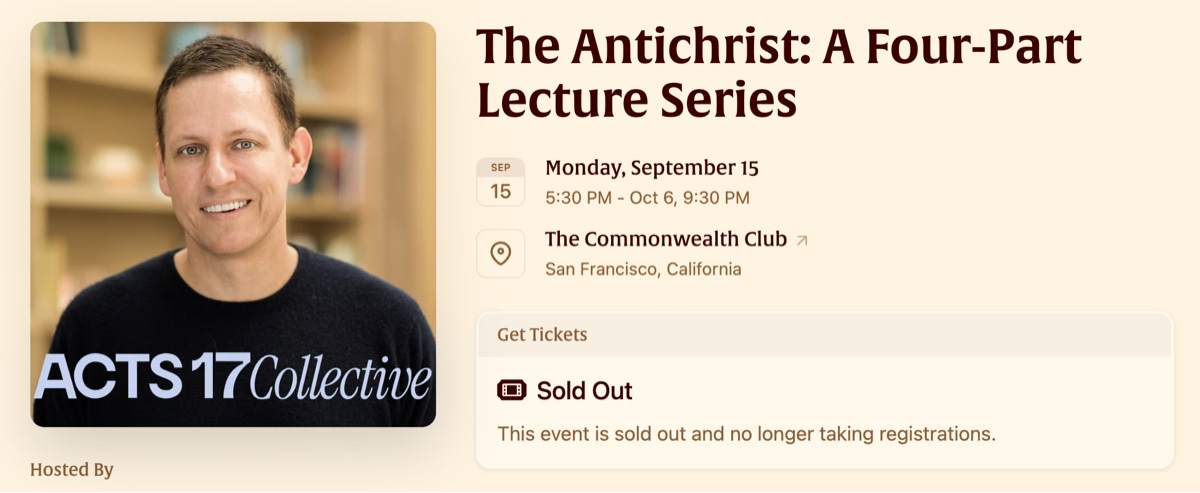
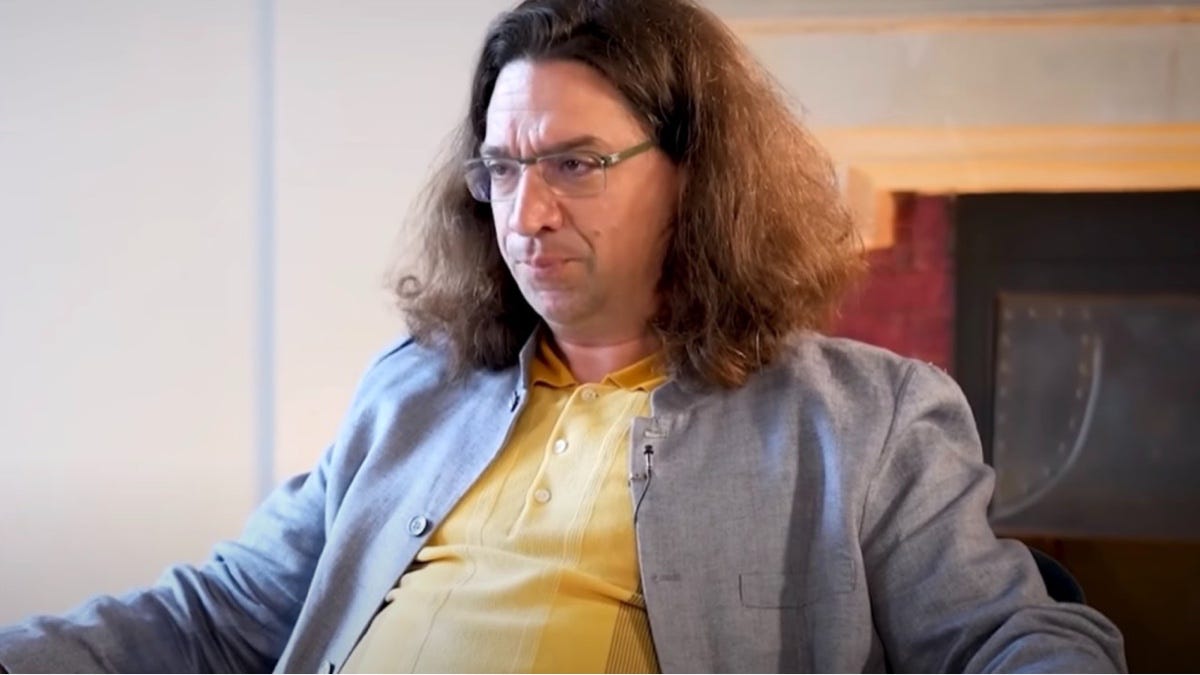


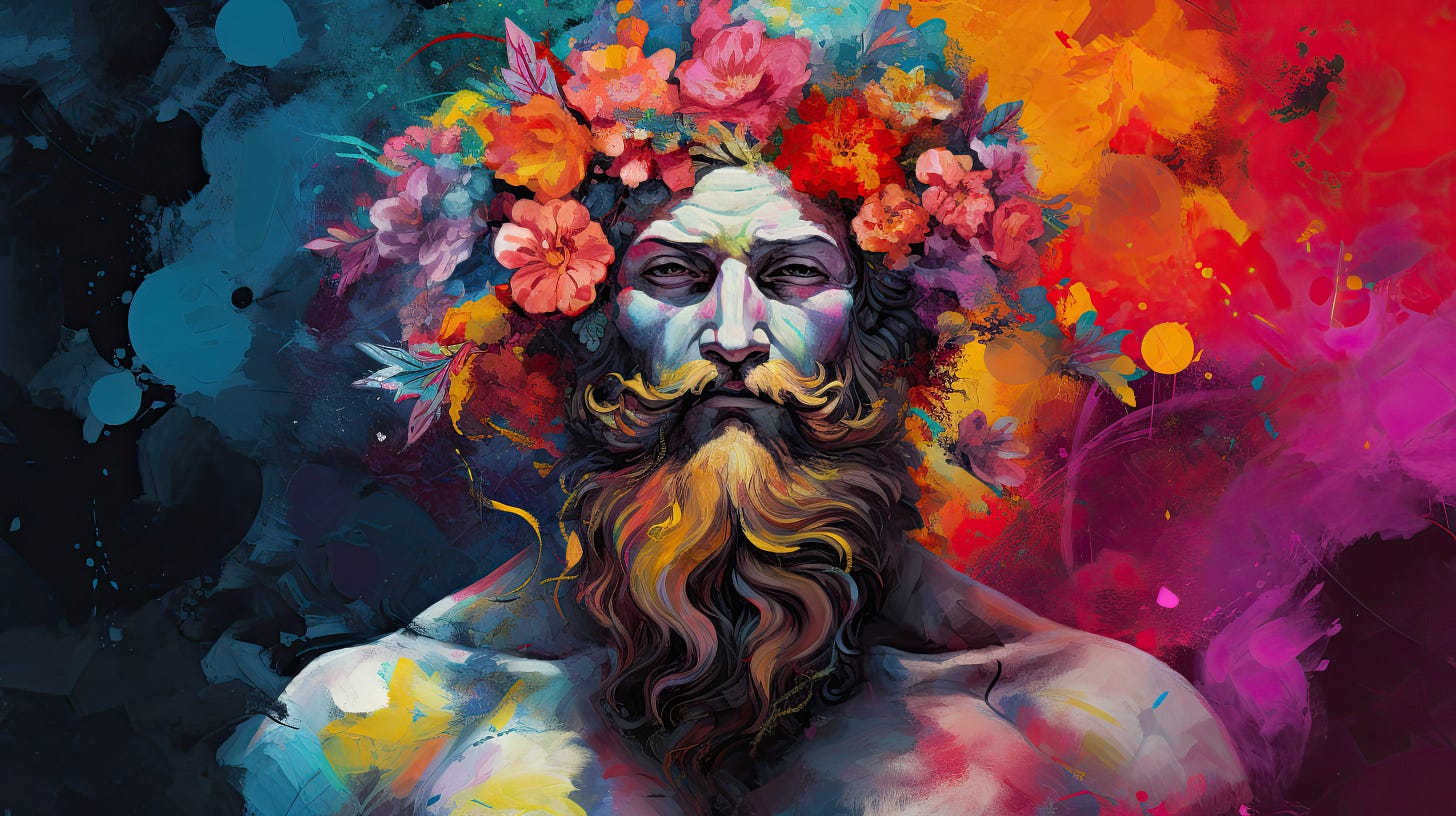
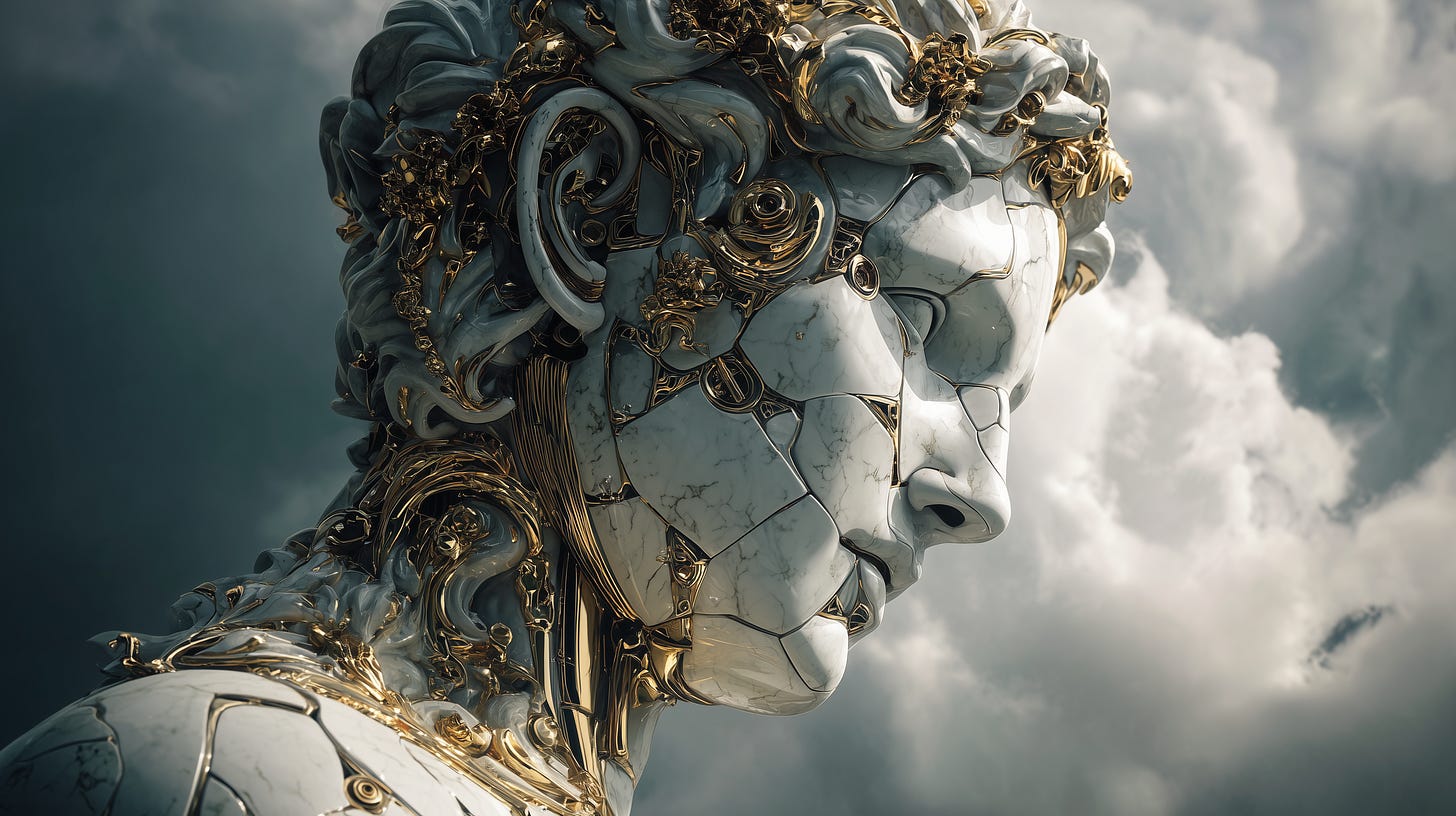
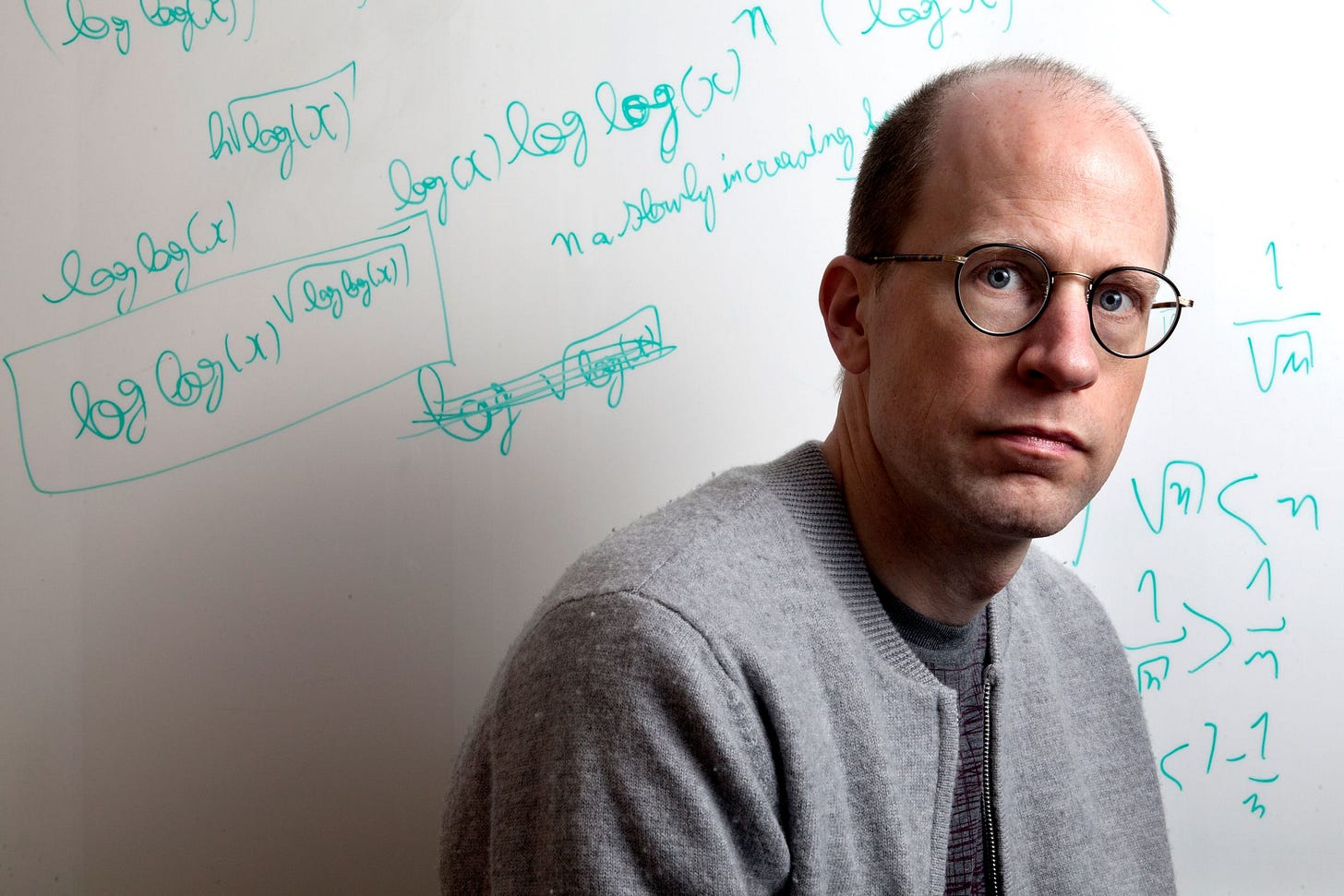
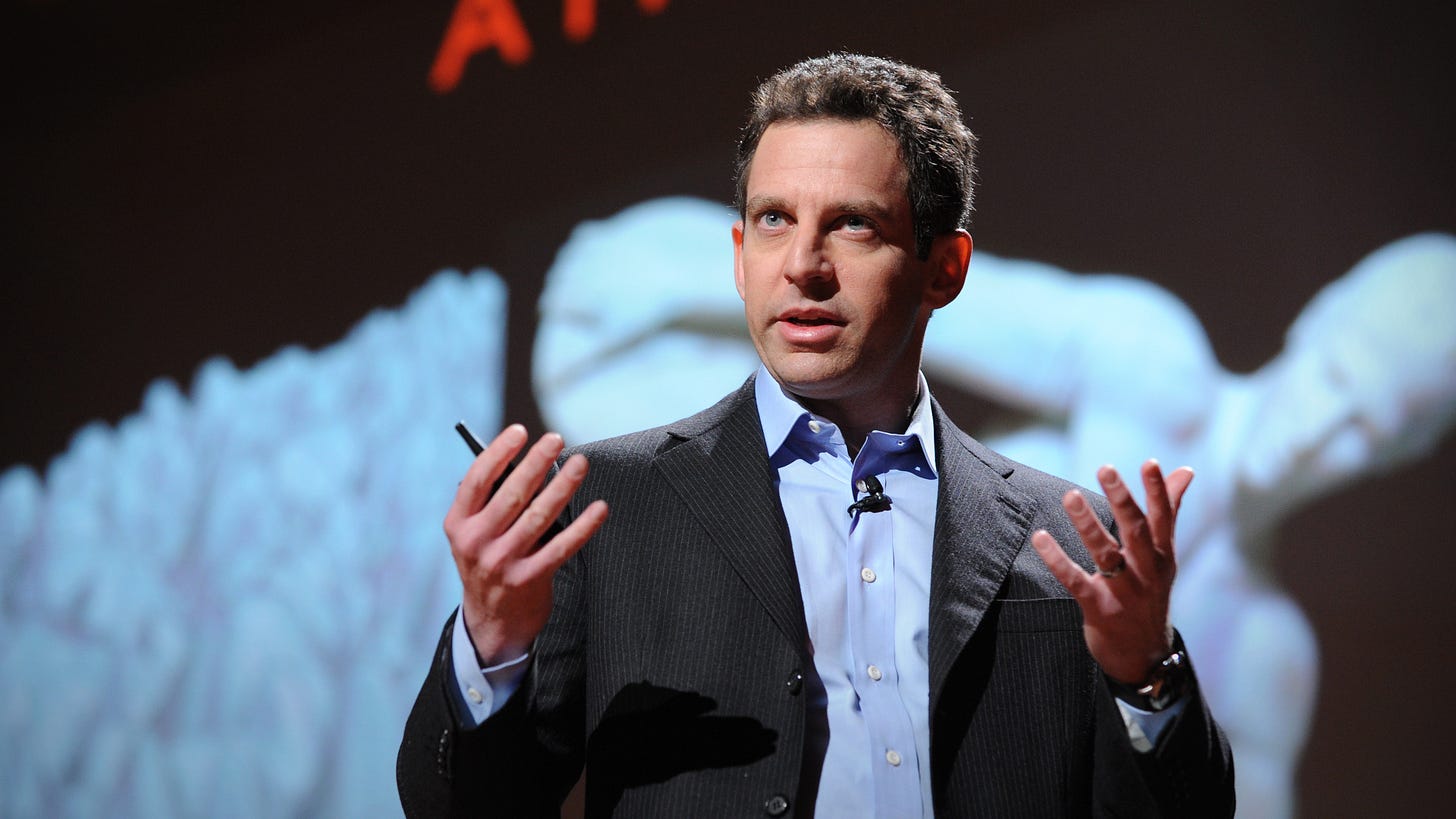
One might think of Yuval Noah Harari as a modern-day Aldous Huxley. Harari himself has credited Brave New World (1932) with shaping his outlook, even writing the introduction to its 90th Anniversary Edition.
But perhaps he should spend some time with Huxley’s later work, The Perennial Philosophy. There, Huxley outlines what he came to see as the antidote to materialist reductionism: a recognition of the deeper spiritual wisdom that technological progress and rationalist hubris tend to bury.
Huxley’s own evolution from reductionism to mysticism embodies the very Apollonian to Dionysian rebalancing you call for. Not that I expect the Tech Bros to take the hint; they’re too busy worshipping at the altar of their own algorithms.
I like the loss of sensory perception example that you provided with scent. We have many subtle organs of perception that are not as visible or definable as the nose's pathway to smell. The ancient cosmologies understood sacred time and cycles rather than pure mechanized time and linear measurements. The modern pythagoreans can't perceive the natural life cycles because it requires that they have the patience to allow unknown potential and beauty to reveal itself without prematurely defining, measuring, and capturing it. They do not understand the importance of learning to expand without grasping or reaching beyond divine design, nor how to create structure without freezing it into an empty tomb. They can't dissolve ignorance and illusions without falling into nihilism, and lack the capacity to integrate the flow of change without bypassing its depth. Without a belief in a vertical sacred structure and a guiding light, they are destined to pursue infinite rational to support any horrific conclusion on the horizontal plane of reality and the bottomless pit of conscious defiance.